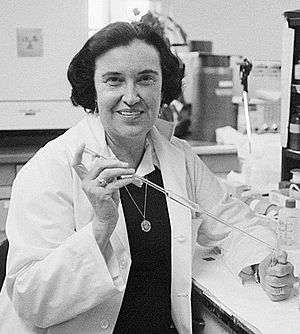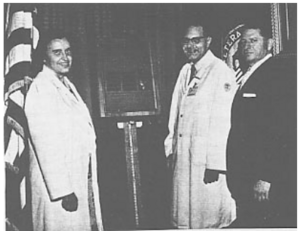Rosalyn Sussman Yalow facts for kids
Quick facts for kids
Rosalyn Sussman Yalow
|
|
|---|---|

Rosalyn Yalow (1977)
|
|
| Born |
Rosalyn Sussman
July 19, 1921 New York City, U.S.
|
| Died | May 30, 2011 (aged 89) The Bronx, New York, U.S.
|
| Nationality | American |
| Alma mater | Hunter College University of Illinois at Urbana–Champaign |
| Known for | Radioimmunoassay |
| Spouse(s) | A. Aaron Yalow (m. 1943; 2 children) |
| Awards | 1972 Dickson Prize 1975 AMA Scientific Achievement Award 1976 Albert Lasker Award for Basic Medical Research 1977 Nobel Prize in Physiology or Medicine 1988 National Medal of Science |
| Scientific career | |
| Fields | Medical physics |
| Institutions | Bronx Veteran's Administration Hospital |
| Influenced | Mildred Dresselhaus |
Rosalyn Sussman Yalow (born July 19, 1921 – died May 30, 2011) was an American scientist who studied how physics can be used in medicine. She won the 1977 Nobel Prize in Physiology or Medicine for helping to create a special test called radioimmunoassay. This test helps doctors measure tiny amounts of important substances in the body. She was the second woman ever, and the first American-born woman, to win this Nobel Prize in medicine.
Contents
Biography
Early Life and Education
Rosalyn Sussman Yalow was born in the Bronx, New York City. She grew up in a Jewish family. She went to Walton High School and then attended Hunter College, which was a college just for women and didn't charge tuition. Her mother hoped she would become a teacher, but Rosalyn decided to study physics instead.
While in college, Rosalyn worked part-time as a secretary for important biochemists at Columbia University. She didn't think graduate schools would accept women or give them money to study. However, after graduating from Hunter College in 1941, she got an amazing offer.
She was asked to be a teaching assistant in physics at the University of Illinois at Urbana–Champaign. This happened partly because World War II had started, and many men had gone to fight. The university needed more students and staff, so they started accepting women for jobs and education. Rosalyn was the only woman among 400 people in the physics department, and the first since 1917. She earned her PhD (a high-level degree) in 1945.
Family Life
In 1943, Rosalyn married Aaron Yalow, who was also a student. They had two children, Benjamin and Elanna. Rosalyn believed that her home life and family were very important. She made sure to balance her work with her duties as a mother and wife.
Even though she focused on her family, Rosalyn also wanted more women to become scientists. She believed that the opportunities she had in physics were due to the war. She thought that after the war, fewer women went into science because they weren't as interested.
Scientific Career and Discoveries
After getting her PhD, Rosalyn Yalow first worked as an electrical engineer. In 1946, she went back to Hunter College to teach physics. She inspired many young women, including Mildred Dresselhaus, who later became a famous scientist known as the "Queen of Carbon Science."
In 1947, Rosalyn started working as a consultant at the Bronx Veteran's Administration Hospital. The hospital wanted to start research using radioactive materials in medicine. By 1950, Rosalyn had set up a special lab there and decided to focus on research full-time.
Developing Radioimmunoassay
At the Bronx VA Hospital, Rosalyn worked with a scientist named Solomon Berson. Together, they created a groundbreaking technique called radioimmunoassay (RIA). This method uses tiny amounts of radioactive substances to measure very small quantities of things in human blood and other body fluids.
At first, they used RIA to study insulin levels in people with diabetes. But soon, scientists realized this technique could be used for hundreds of other substances, like hormones, vitamins, and enzymes. Before RIA, these substances were too small to detect.
RIA changed medicine forever. It made it possible to:
- Diagnose many hormone-related health problems.
- Screen blood donations for diseases like hepatitis.
- Detect foreign substances in the blood, including some types of cancer.
- Measure how well antibiotics and other drugs work.
Even though RIA had huge commercial potential, Rosalyn Yalow and Solomon Berson chose not to patent it. This meant that anyone could use their method, which helped it spread quickly and benefit many people around the world.
After Solomon Berson passed away in 1972, Rosalyn continued her important work. She became a professor at Mount Sinai Hospital. She also loved to mentor young scientists from all over the world. One of her students, Dr. Narayana Panicker Kochupillai, became a leading expert in India, studying thyroid hormones. Because of her huge impact, Rosalyn Yalow is sometimes called "the Mother of Endocrinology" (the study of hormones).
Awards and Recognition
Rosalyn Yalow received many awards for her amazing contributions to science.
- In 1961, she won the Eli Lilly Award from the American Diabetes Association.
- In 1962, she received the Gairdner Foundation International Award, which honors top biomedical scientists.
- In 1972, she was given the William S. Middleton Award for Excellence in Research, a top honor for scientists working for veterans' healthcare.
- In 1975, she and Solomon Berson (who had passed away) received the American Medical Association Scientific Achievement Award.
- In 1976, she became the first woman and first nuclear physicist to win the Albert Lasker Award for Basic Medical Research. This award celebrates major discoveries that improve human health.
Nobel Prize
In 1977, Rosalyn Yalow won the Nobel Prize in Physiology or Medicine. She shared the prize with Roger Guillemin and Andrew V. Schally, who worked in a different field. Rosalyn was honored for her role in creating the radioimmunoassay technique. She was the sixth woman ever to win a Nobel Prize in a scientific field, and the second woman to win in the medicine category. This was a huge achievement!
Other important awards she received include:
- The Golden Plate Award of the American Academy of Achievement (1977).
- Election as a Fellow of the American Academy of Arts and Sciences (1978).
- The National Medal of Science (1988), which is the highest honor for science and technology in the U.S.
- She was inducted into the National Women's Hall of Fame in 1993.
Death
Rosalyn Yalow passed away on May 30, 2011, in the Bronx, New York. She was 89 years old. She left behind her two children, Benjamin and Elanna, and two grandchildren. She is buried in Mount Moriah Cemetery in Fairview, New Jersey.
Images for kids
See also
 In Spanish: Rosalyn Yalow para niños
In Spanish: Rosalyn Yalow para niños
- List of female Nobel laureates
- List of Jewish Nobel laureates
- Timeline of women in science
 | Delilah Pierce |
 | Gordon Parks |
 | Augusta Savage |
 | Charles Ethan Porter |



